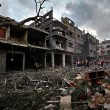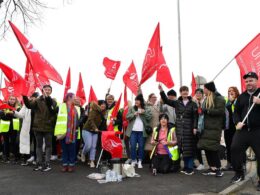Hands off our health service
By Pat Lawlor, health worker RVH Belfast
IN 2007, the Northern Ireland Executive introduced its Programme for Government for health. It was heralded as a means to enhance the health and well-being of the people of Northern Ireland into the next decade.
It has become obvious to all that this was a lie, as cuts, closures and job losses are now being implemented across the health service. All the political parties in the NI Executive have agreed to carry out £700 million cuts in health.
The centralisation of the health authority, which will replace the four existing Health and Social Services Boards, will lead to the loss of 1,700 administrative jobs. The NI Executive believes they can save £343 million through merging administrative jobs. This “reorganisation and rationalisation” of board services will amount to “savings” of £128m, which means an additional £215m will come in the form of further cuts in administration and support services.
The list of proposed job cuts and closures grows daily with the latest attacks on workers and communities planned under the Northern Health and Social Care Trust. So-called “consultation” meetings are being held on the decision to close A&E and acute services at Magherafelt, the closure of five elderly residential homes, the downgrading of respite care for children, the closing of respite care for adults with learning disabilities and the downgrading of care and services for people suffering with mental illness.
These attacks by the NI Executive go completely against all medical logic. Mortality rates are 2.4% higher than the rest of the UK. Statistics show mental health needs in the North are also significantly higher, with 10-20% of young people suffering mental health problems. Suicide and self-harm rates in deprived areas, particularly amongst the youth, are amongst the highest in Europe. The number of people with learning disabilities is projected to increase over the next fifteen years. But this is only the beginning of a process of cuts. In order to maintain current services, the health budget should have received 4.3% funding, but the Assembly Executive only provided 1.1%. These cuts must be met with a united mass campaign of local communities and health workers across the North to force the Assembly Executive and Trusts to abandon their attack on our health service.
How to fight the health cuts
THESE VICIOUS attacks have unleashed huge anger amongst workers and communities within the Northern Trust, with spontaneous protests and campaigns developing against cuts in services so far in areas such as Larne, Coleraine, Ballymoney and Magherafelt. It is essential a fighting campaign is established to prevent the parties in the Executive succeeding in destroying much needed services.
The key to building a powerful opposition to these cuts is by building support in local communities and amongst health workers on a local level and bringing together the different groups across the North to build a united campaign against all cuts.
Local protests against cuts should be organised to demonstrate the depth of opposition which exists to the Trust’s and the Assembly’s plans. Tactics such as taking direct action to stop the closure of services like residential care homes should not be ruled out.
A few politicians have appeared at some meetings and spoken out against the cuts, but they cannot be trusted. It is their parties which have ordered these cuts. If they are genuine in their opposition, then they should demand that their parties drop their support for the cuts in the Assembly or else resign from their party on principle.
The trade unions should play a major role in building the opposition by organising protests and if necessary preparing to take industrial action to defend our health service. To date however, the leaders of the unions in the health service have been nowhere to be seen. It is essential ordinary union members raise within their unions that action is needed to save services.








